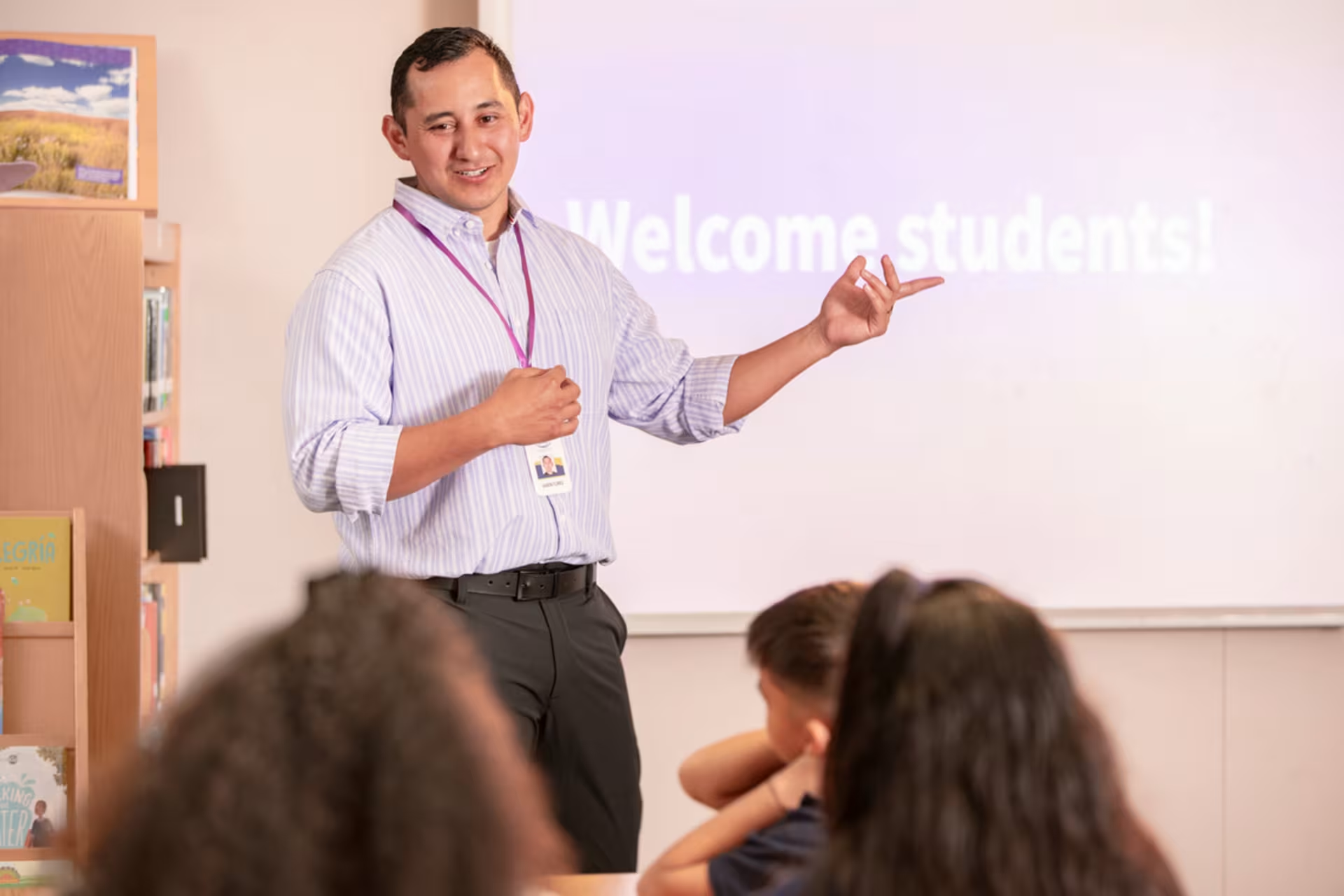
Online MEd in Secondary Education: Humanities Emphasis
Teach and Inspire Through Humanities Education
The Master of Education in Secondary Education with an Emphasis in Humanities program can prepare you to become a licensed secondary education teacher (grades 6–12) with a specialty in teaching humanities. This online(See disclaimer 1) program is offered by the College of Education — a teacher’s college for over 70 years that prepares learners to enrich lives through quality education.
Help broaden students’ worldview through exposure to history, cultures, literature and languages. Dive into the foundations of teaching, curriculum development and assessment methods for secondary education.

Up to 12 credits or 1/3 of the total program requirements in transfer (whichever is less)
Credits: Fill out the Lopes Eval to find out what will transfer
Admission Requirements (Master's)
- Undergraduate Degree*
- 2.8+ GPA
OR 2.5+ Unweighted GPA and
- GMAT: 500
- GRE: 300 combined**
Admission requirements may differ based on degree level, program and modality, or transfer status. Some programs of study may require a higher GPA and/or other qualifying criteria for admission. Please review full admission and program requirements in the University Policy Handbook.
* Degree must be from an accredited college or program that has been approved by GCU.
** Combined verbal/quantitative, after August 2011 (1,000 combined verbal and quantitative, prior to August 2011).
Grow as an Educator Through Purpose-Driven Learning
Humanities education is critically important for all of life’s experiences, as it explores fundamental questions about who we are, where we are in life (theoretically speaking) and how we got there.(See disclaimer 2) GCU can prepare you to become a teacher who guides your students in engaging in critical reflection, developing empathy and recognizing the value of diversity.
As a Christian university, GCU offers a faith-integrated curriculum that embraces the Christian worldview and encourages learners to approach teaching humanities with a mindset of ethical servant leadership.
You can earn this MEd via online(See disclaimer 2) coursework, allowing for more flexibility in your education. Access online courses via our e-learning platform, which connects learners to qualified instructors who encourage interactive learning. The program will conclude with a full-time, in-person student teaching practicum.
GCU is committed to making quality education more accessible to all learners. You can advance your education in an affordable way without sacrificing academic quality.
Explore Key Topics in Secondary Humanities Education
This MEd in Secondary Education: humanities emphasis explores teaching grades 6–12, with a focus on teaching subjects such as English, social studies, history and literacy. This program highlights the integration of technology, diversity in education and modern teaching methodologies in today’s classrooms.
Courses explore topics such as student assessment and evaluation, adolescent psychology, managing learning environments, curriculum development and instructional methodologies for middle and high school settings. This program is designed specifically for aspiring educators who have a non-teaching bachelor’s degree and who would like to transition to a career in the education field. Unlicensed teachers in private schools may also pursue licensure with this degree program.
All courses meet the standards from the Interstate Teacher Assessment and Support Consortium (InTASC) and the International Society of Technology Educators (ISTE). Along with coursework, you will participate in secondary education field experiences that guide you through 100 hours of practice-based and observational experiences. This experiential learning component provides practice in applying pedagogical theories in actual classrooms.
The Difference Between Initial Licensure and Non-Licensure Programs
Initial licensure vs. non-licensure programs differ in their intended outcomes. Initial licensure programs prepare individuals to obtain professional licensure, whereas non-licensure programs are for learners who are already licensed teachers or who are pursuing an education job that doesn’t require licensure.
Individuals may opt for the non-licensure version of this MS in a teaching humanities program to enrich their practice without the commitment to licensure requirements. This non-licensure degree focuses on advanced scholarly research and can be a good fit for licensed teachers interested in advanced career qualifications. The non-licensure degree omits the student teaching component.

Prepare To Teach Humanities With Your MEd Degree
This master’s in secondary education: humanities emphasis is designed to prepare you to pursue licensure as a secondary teacher and apply to teaching jobs in middle and high school settings. As a humanities teacher at the secondary level, you can expect to teach one or more specific subject areas, with the opportunity to develop deep expertise within your specialty area. Alternatively, you may decide to pursue a career as a postsecondary education teacher — a role in which you would help prepare future educators to make a positive impact on their students.
As a humanities education teacher, you may help students:
Ask questions about the world
Understand diversity and the human experience
Explore society through a historical lens
Refine writing and reading skills
Learn to think creatively
Become informed and critical citizens
Median annual salary of high school teachers as of May 2024(See disclaimer 3)
Openings expected for high school teachers, each year, from 2024 through 2034(See disclaimer 4)
Earn Your MEd at an Accredited University
This Arizona State Board of Education-approved program may be ideal for those who would like to pursue teacher licensure at an accredited university. It has received programmatic accreditation from the Association for Advancing Quality in Educator Preparation (AAQEP), a national accrediting organization that evaluates education degree programs for quality and effectiveness.
In addition, this MEd benefits from GCU’s institutional accreditation. GCU has been continuously accredited by the Higher Learning Commission since 1968.
Frequently Asked Questions
Whether you’re already teaching or just beginning a career in teaching, you may have questions about this career path. Use the following answers to frequently asked questions to guide your decision-making process.
What do you study in an MEd in Secondary Education with a humanities focus?
What does a humanities educator teach in high school?
What can I do with an MEd in Secondary Education: humanities emphasis?
Is a master's in secondary education: humanities emphasis worth it?
Program Curriculum
Core Courses

Share your passion for humanities and inspire the rising generations of students. Apply to GCU’s master’s in secondary education: humanities emphasis.
If you are seeking licensure/certification, please refer to the "Accreditation and Compliance/State Disclosures” link for the specific program of interest’s website for your location and/or employment state’s licensure requirements, per 34 CFR 668.14(b)32 and 668.43(c).
Excluding observational and practice-based experiences and student teaching.
- Mintz, S. (2021, Aug. 30). Why We Need the Humanities in Today’s Career-Focused World. Inside Higher Ed. Retrieved December 2025.
- The earnings referenced were reported by the U.S. Bureau of Labor Statistics (BLS), High School Teachers, as of May 2024, retrieved December 2025. Due to COVID-19, data from 2020 to 2023 may be atypical compared to prior years. BLS calculates the median using salaries of workers nationwide with varying levels of education and experience. It does not reflect the earnings of GCU graduates as high school teachers, nor does it reflect the earnings of workers in one city or region of the country or a typical entry-level salary. Median income is the statistical midpoint for the range of salaries in a specific occupation. It is very unlikely that a median salary will reflect an entry-level salary. It represents what you would earn if you were paid more money than half the workers in an occupation, and less than half the workers in an occupation. It may give you a basis to estimate what you might earn at some point if you enter this career. Grand Canyon University can make no guarantees on individual graduates’ salaries. Your employability will be determined by numerous factors over which GCU has no control, such as the employer the graduate chooses to apply to, the graduate’s experience level, individual characteristics, skills, etc. against a pool of candidates.
- COVID-19 has adversely affected the global economy and data from 2020 to 2023 may be atypical compared to prior years. Accordingly, data shown is effective August 2025, which can be found here: U.S. Bureau of Labor Statistics, Occupational Outlook Handbook, High School Teachers, retrieved December 2025.


